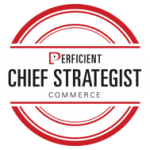The “Amazon effect” and other convenient online shopping experiences have skyrocketed consumer expectations. You can buy just about anything via the web, mobile apps, and more recently, with devices like Amazon Echo or Google Home.
For brands to keep up with these expectations, commerce platform solutions are evolving just as quickly. In the last few years, there’s been a continuous consolidation of commerce technology platforms:
- SAP bought Hybris (2013)
- Salesforce’s purchase of Demandware (2016) and CloudCraze (2018)
- Adobe’s acquisition of Magento (2018)
 Another major shift in the eCommerce platform landscape came at the end of last year when HCL Technologies announced its acquisition of several IBM solutions, including the flagship commerce portfolio, Watson Commerce. The news sparked significant chatter among people in the digital commerce world, leading Mike Rabbior, our Commerce Chief Strategist, to share his perspective during an in-depth interview, separating fact from fiction.
Another major shift in the eCommerce platform landscape came at the end of last year when HCL Technologies announced its acquisition of several IBM solutions, including the flagship commerce portfolio, Watson Commerce. The news sparked significant chatter among people in the digital commerce world, leading Mike Rabbior, our Commerce Chief Strategist, to share his perspective during an in-depth interview, separating fact from fiction.
Here’s a summary of what you need to know:
Rationale behind IBM selling its 20-year old commerce solution
“As an IBM technologist for almost a decade, I can tell you that IBM is a company that is over 100 years old for a reason – it constantly reinvents itself. One of the greatest banners IBM can fly is that it has constantly kept up with the change in direction and demand.
“This sale is part of the continuing evolution of IBM. The company’s push toward cloud, artificial intelligence (AI), and internet of things (IoT) is its strategic focus. Selling its commerce portfolio allows IBM to divest in areas that aren’t strategic and fully commit to technologies where it sees the potential for higher value and higher margin.”
Perpetuating the consolidation of commerce platforms
“Over the last decade, almost every major digital commerce platform has undergone a major acquisition. Adobe acquired Magento last year. Before that, Salesforce purchased CloudCraze and Demandware. SAP bought Hybris not too long ago. All have been retooled and repurposed through acquisitions, and none have gone extinct in the process.
Putting rumors to rest
“Some of the confusion came from initial press releases that referenced only ‘on-premise’ technologies. Some stated IBM would continue with its cloud and SaaS [commerce platforms], and give the legacy on-premises [commerce] platform to HCL. That’s not the case. Every commerce platform built by IBM is going to HCL as intellectual property.
“There is also the misconception that this is the end of the IBM Commerce platform. On the contrary, I think you will see HCL bring a second wind to the platform. When a company spends almost $2 billion dollars buying assets from [a company like IBM], it has a strong desire not to damage or cause negative consequences. Based on my interactions with HCL, I expect it to be very open to customer and partner feedback.”
Consider reassessing your situation
“Nothing is immediately changing, and you certainly don’t need to do this alone. Considering the number of available platforms and the rapid pace of this industry, you may need help understanding your options. Take that to heart. Then, use this news as a catalyst for assessing your situation, and finding [a partner] who can help you exercise due diligence in choosing the direction that is right for you.”
For more insights, read Mike Rabbior’s full interview on our Perficient Digital blog.
You can also learn how we’re helping customers evolve their commerce platforms to grow their businesses.

